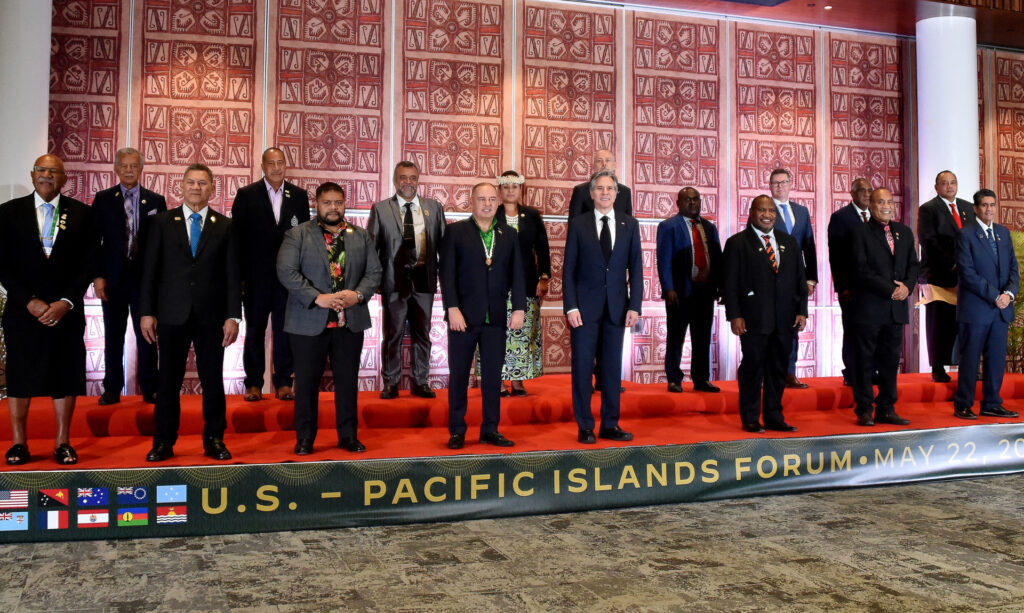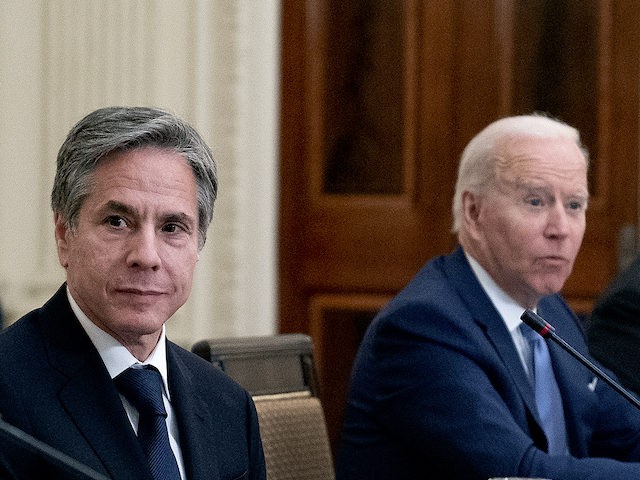U.S. Secretary of State Antony Blinken joined Indian Prime Minister Narendra Modi for meetings with 14 Pacific Island leaders in Papua New Guinea (PNG) on Monday.
Blinken announced the U.S. would sign a defense agreement with PNG, hopefully, a sign that feelings were not too hurt when President Joe Biden canceled his own visit to the island last week.
The White House canceled Biden’s visits to PNG and Australia last week so the president could return home to participate in debt ceiling negotiations. PNG had declared a public holiday for Biden’s visit, and a visibly frustrated Australian Prime Minister, Anthony Albanese, canceled a meeting of the Quad security alliance that would have been convened while Biden was in Sydney. Japanese Prime Minister Kishida Fumio held the meeting in Hiroshima, instead, where the leaders had convened for the G7 summit this weekend.
China, which has been pushing to extend its influence across the Pacific Islands, portrayed both Biden’s cancellation and the U.S. debt crisis as evidence that Beijing was a better partner for regional leaders than Washington.
Blinken and PNG Prime Minister James Marape said the defense agreement signed on Monday was an update and extension of existing U.S.-PNG military cooperation. Marape stressed that it has “nothing to do with China.”
“We have a healthy relationship with the Chinese government and they are an important trading partner,” said Marape.
Blinken said the updated agreement would give PNG more resources for humanitarian aid and disaster relief, provide more training for military personnel, and allow the U.S. and PNG to “better patrol” the region together.

Papua New Guinea’s Prime Minister James Marape (front 3rd R), US Secretary of State Antony Blinken (front C), leaders from Pacific Islands, and representatives from New Zealand and Australia pose for photos during the US-Pacific Islands Forum at the APEC Haus in Port Moresby on May 22, 2023. (Photo by ANDREW KUTAN/AFP via Getty Images)
“We are working together to shape the future. We are very much looking forward to taking our partnership to the next level,” Blinken said.
The U.S. State Department on Sunday hailed PNG as “the largest Pacific Island country, a like-minded democracy, APEC member and regional energy partner,” making it a “key partner for the United States in the Indo-Pacific region.” APEC is the Asia-Pacific Economic Cooperation forum.
According to the State Department, the U.S. plans to add another $10 million in funding for the Strategy to Prevent Conflict and Promote Stability (SPCPS) in PNG. The SPCPS is a foreign aid program that helps several U.S. partner nations, ranging from PNG to Haiti, Libya, Mozambique, and coastal West African nations, to maintain political stability by “supporting sustainable and equitable economic growth” and “improving justice systems.”
The U.S. will also provide the PNG Defense Force with $12.4 million in equipment, including body armor and dress uniforms that will be used when PNG celebrates the 50th anniversary of its independence in 2025, plus $4 million in funding to fight organized crime. PNG has persistent problems with gang violence, drug trafficking, and corruption.
An important element of the expanded U.S.-PNG defense agreement is reportedly greater use of U.S. satellite surveillance to help the PNG fight “illegal activities on the high sea,” as Marape put it last week. In exchange, the U.S. will gain greater access to PNG ports and territorial waters.
Indian Prime Minister Modi talked up multilateralism and a “free, open, and inclusive Indo-Pacific” at his own summit in Port Moresby. Marape praised Modi as “the leader of the Global South” and asked him to be an “advocate” for smaller nations. The “Global South” is India’s blanket term for developing nations that feel somewhat neglected by big multilateral organizations like the G7 and G20.
Blinken’s arrival in PNG was met with protests at several of its universities from students who think Marape is giving the United States too much control over key facilities. Port Moresby was put on high-security alert while Blinken was in town.
China was relatively relaxed about Blinken’s visit since he and Marape were cautious not to frame their cooperation as explicitly anti-China in character, and the door remains open for Beijing to make its own deals with PNG.
“What we need to be vigilant about is engaging in geopolitical games in the name of cooperation, and we also believe that no cooperation should target any third parties,” Chinese Foreign Ministry spokeswoman Mao Ning said.

COMMENTS
Please let us know if you're having issues with commenting.